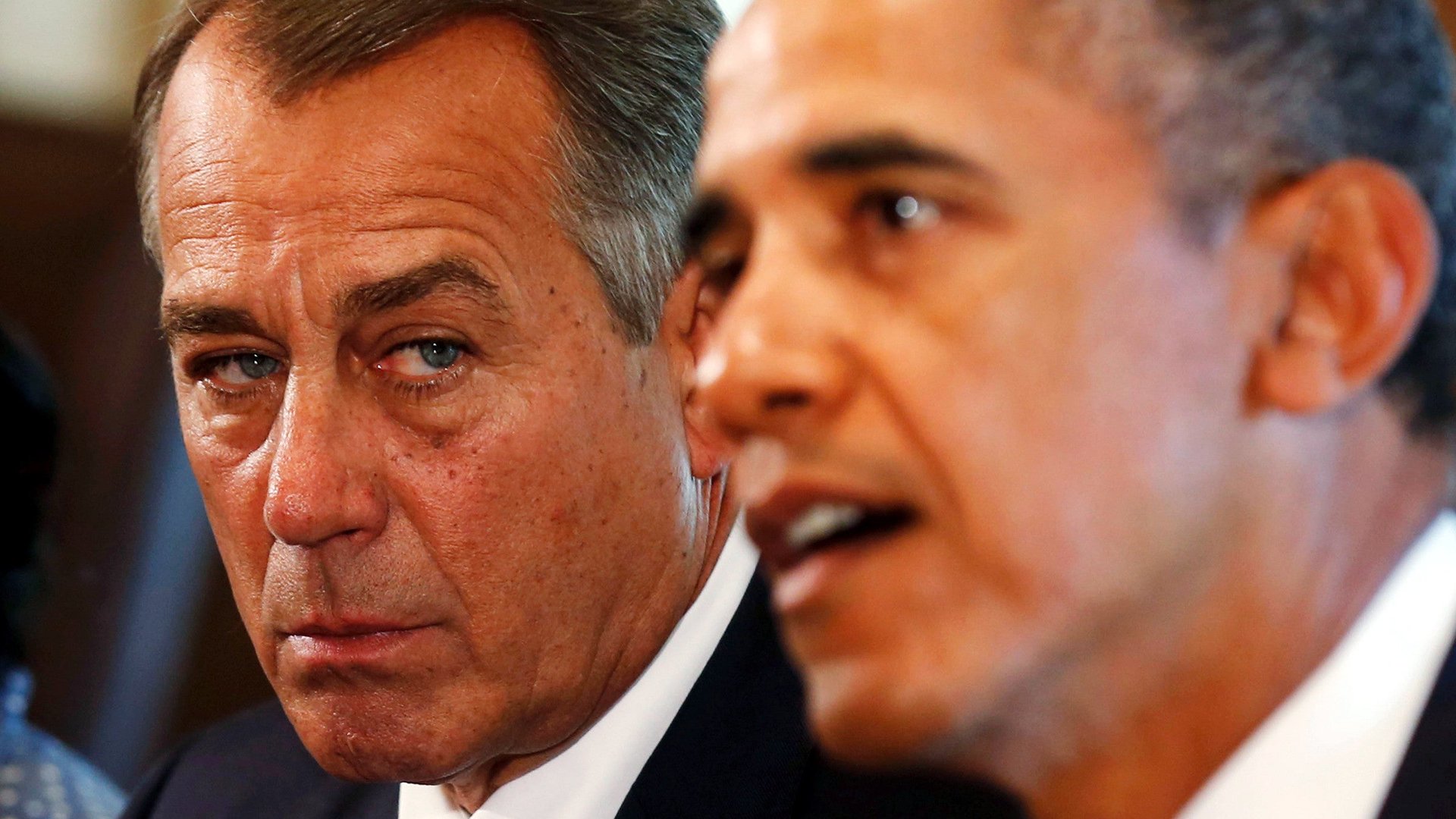The fate of the global economy is in the hands of the US Congress (again)
Think the drama over America’s “fiscal cliff” was ugly in 2012? Here’s a play-by-play of all the opportunities to rock the global economy ahead, thanks to persistent, deep divides within the US government:


Think the drama over America’s “fiscal cliff” was ugly in 2012? Here’s a play-by-play of all the opportunities to rock the global economy ahead, thanks to persistent, deep divides within the US government:
First, what to do about Syria
On a geo-political front, US president Obama has asked Congress to support a plan to bomb Syria in an effort to enforce international norms against the use of chemical weapons. The failure of a similar vote in the United Kingdom, alongside Russia and China’s consistent obstruction of action in the United Nations, leaves the US as the main driver of any punitive strike.
Republican speaker of the House John Boehner and his number two, Eric Cantor, have expressed support for Obama’s plans, suggesting something of the usual rally-round-the-flag bipartisan support for military actions. But Boehner has become known for his inability to control the conservatives in his caucus, and with many on the US left skeptical of foreign intervention, it’s not clear what the final authorization vote will look like—or if Obama will even listen if Congress says no. Senate leaders have not provided the same level of support, and it’s possible a right-left coalition leery of mission creep could block such authorization.
Needless to say, markets don’t like uncertainty about war, and an expanding conflict in the Middle East could have broader repercussions, especially for oil. The political dynamics around authorization will help set the stage for another challenge with serious financial consequences…
Next up: fiscal follies
Two big dates this fall: On October 1, absent an agreement on spending levels, the US government shuts down. And just a few weeks later, the government will run up against the debt limit (the total amount the US is authorized to borrow); if Congress can’t agree to allow more borrowing, the US will, for the third time in as many years, enter a grey area that could end in a financial or political crisis (take your pick). Brinksmanship around the ceiling in the summer of 2011 and the fiscal cliff in 2012 roiled markets. This year, Republicans are insisting on major changes to the Obama administration’s signature health care law, while the Obama administration is asserting (correctly) that it isn’t negotiating over the debt ceiling, because it’s too dangerous to mess around with.
Here’s the problem: While America’s fiscal outlook is improving rapidly, the political outlook is not. Republican Senate leader Mitch McConnell, usually a pivot point for compromise, faces a reelection campaign this year and the need to maintain his conservative bona fides. Conservative politicians in both chambers feel like last spring’s agreement to suspend the debt ceiling in favor of a return to the regular budget process hasn’t served their purposes, and their leaders have been promising them that the fall’s fiscal debate will be the right venue to enact fiscal reforms broadly opposed by the president and Democrats in the Senate. The Democrats, meanwhile, would really like to ease off the automatic budget cuts that have slowed US growth and target fiscal consolidation on a longer-term scale (and with tax increases Republicans don’t like). Picture two tectonic plates, grinding in opposite directions, preparing to snap into new positions—and release all that energy.
There is hope that the severe consequences of inaction will prompt an agreement, but it will only take a few days of stalled talks or a failed vote to generate economic consequences. And if that’s not enough…
On the horizon: the Federal Reserve’s new leader
Sometime this fall, Obama is due to nominate a new Federal Reserve chairman. We’ve covered the debate over Ben Bernanke’s successor, but while we still don’t know who the nominee will be, even the rumors of putative front-runner and former US Treasury secretary Larry Summers inheriting the throne have been pushing up bond yields, just as expectations of the Fed slowing down its bond-purchase program have investors pulling money out of emerging markets. Just imagine what happens when Summers (or Janet Yellen or a dark horse candidate) ends up getting grilled by the Senate for days, especially facing the chamber’s emboldened libertarian contingent in the weeks after a debt ceiling resolution that’s likely to disappoint them. US monetary policy has ripple effects across the globe (take, for instance, its effect on the India’s rupee crisis) and an unscripted conversation with any nominee, much less someone as ambiguous about his views as Summers, will have traders on their toes.